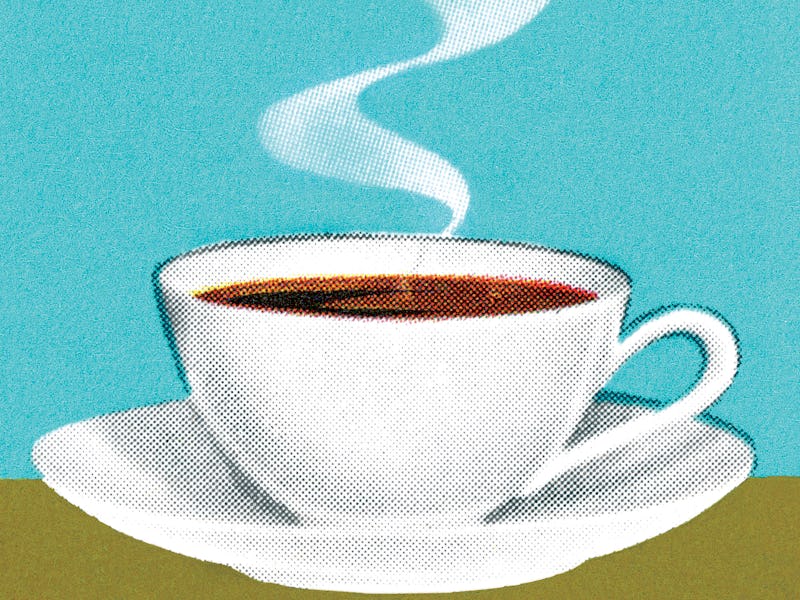Longevity hack: Study supports an extra workout perk from coffee
Coffee before exercise helps you feel the burn (literally).

The relationship between caffeine and exercise is a strange one. You may have heard a range of confusing advice about the merits of this pairing — that your morning brew dehydrates you before a workout, that caffeine boosts your performance, and a whole host of spurious claims and anecdotes in between.
But there is some evidence to support the claim that caffeine before a workout does actually help with fat-burning — technically called “fat oxidation” — and that the time of day you drink your cup matters, too.
A study out in the Journal of the International Society of Sports Nutrition found that in a small group of active men aged 32 years old on average, imbibing caffeine 30 minutes before a workout boosted their “maximal fat oxidation” during workouts. The study also suggests the effects of caffeine on exercise were greatest if taken during the afternoon or early evening.
LONGEVITY HACKS is a regular series from Inverse on the science-backed strategies to live better, healthier, and longer without medicine. Get more in our Hacks index.
HOW THIS AFFECTS LONGEVITY — Exercise conveys many health benefits beyond “fat-burning,” and not everyone who works out even cares about the weight loss associated with the practice. But this study suggests that, at least for men of a certain age, having a cup of coffee about 30 minutes before engaging in aerobic exercise can set the stage for higher “maximal fat oxidation,” which means a person’s use of fat as the primary energy source for the body. This value is measured in grams per minute. When this rate gets a turbocharge from coffee, the idea is that one would burn more fat faster.
In fitness circles, burning fat is often the desired effect of exercise — and for people with health conditions complicated by high body fat, creating the right conditions to metabolize it more efficiently could be a step on a path to a longer, healthier life. Improving the body’s ability to metabolize fat can in turn lead to improvements in metabolic diseases, like diabetes and obesity.
This study’s sample size was small and limited — only 15 men — and did not include women, less active people, or younger or older groups. But it hints at ways to amplify the body’s fat-burning potential, which could be beneficial for those looking to improve their health, no matter the demographic.
The study authors suggest that for endurance athletes — think ultra-marathoners — the effect on fat-burning from caffeine, especially caffeine consumed in the afternoon, could come in particularly handy.
If athletes burn fat with moderate exercise, the study authors reason, they may be able to preserve stores of glycogen (from dietary carbohydrates) in the liver and muscles for use as energy in competitions and training sessions. These athletes, with some well-timed caffeine, could literally last longer in an activity that requires them to put out prolonged physical effort.
A figure from the study shows that participant’s MFO (maximal fat oxidation) was highest in the afternoon, after caffeine ingestion.
WHY IT'S A HACK — Previous studies offer evidence that caffeine could boost workout performance and that doing exercise in the afternoon is more effective, but few studies have combined the two elements like this research.
Caffeine improves energy use in prolonged and endurance exercises (like running, swimming, or cycling). Not to mention, people who take caffeine tend to feel more alert, less tired, and enjoy exercise more than those who steer clear of the coffee. Other studies suggest that athletes perform their best in the afternoon and early evening. It’s thought that this has to do with higher body temperature in the afternoon, which is part of the circadian rhythm of the body.
But this study goes further by testing the hypothesis that fat-burning, in particular, was enhanced by both coffee and the time of day. Together, caffeine and the body’s biological state in the afternoon contributed to the highest rate of fat burning — specifically when caffeine was ingested 30 minutes before a workout.
Coffee on the run looks good, but caffeine’s beneficial effects on a workout come from having it 30 minutes before starting.
SCIENCE IN ACTION — The researchers recruited 15 active men aged between 25-39, and tested them in four conditions, with a week in between each condition:
- Morning (8 AM - 11 AM): 3 milligrams caffeine per kilogram of body weight 30 minutes before workout
- Morning (8 AM - 11 AM): Cellulose placebo 30 minutes before workout
- Afternoon (5 PM - 8 PM): 3 milligrams caffeine per kilogram of body weight 30 minutes before workout
- Afternoon (5 PM - 8 PM): Cellulose placebo 30 minutes before workout
Each of the 15 participants completed the various test conditions in random order. The men and the study team were “blind” to what the participants were ingesting at any point in the study, so both the men and the researchers didn’t know if they were in a placebo or experimental phase at any given time. To make sure the men couldn’t tell the difference, the caffeine and the cellulose placebo came in the form of odorless, colorless substances that were dissolved in water and served in opaque containers. All the men followed uniform diets and did not eat during the three hours prior to each test.
The men worked out after drinking either the caffeine or placebo solution and performed two cycling exercise tests, one of which had a slightly increased intensity than the other. During these cycling sessions, the researchers collected data on the participants’ respiration, heart rate, and breath using special devices. With these data, they then calculated the rate of the participants’ maximal fat oxidation, maximal oxygen uptake, and the intensity level at which the maximal fat oxidation rate was reached during the workout.
HACK SCORE OUT OF 10 — ☕☕☕☕☕☕☕☕/10 We’ll have another cup, please.